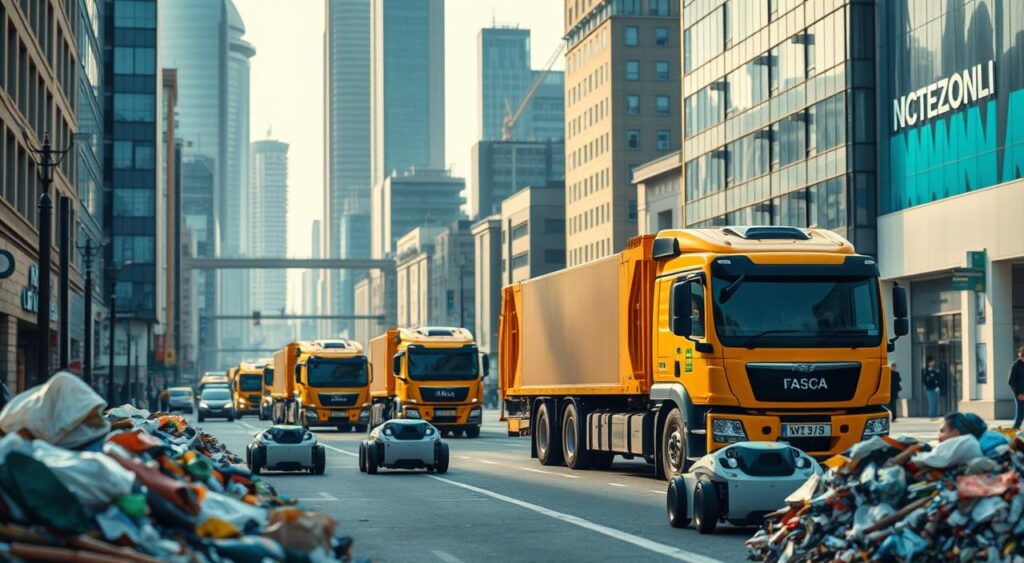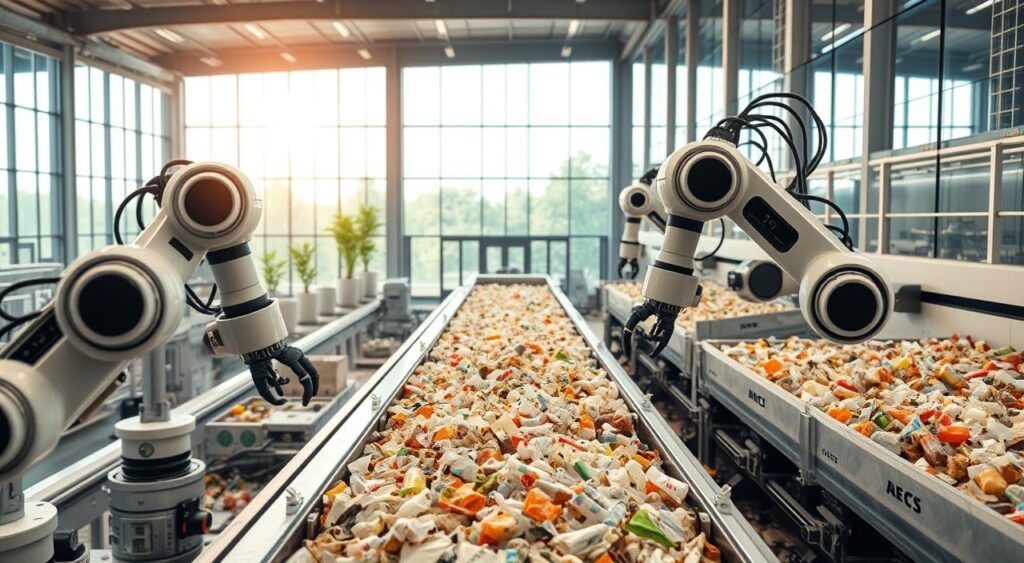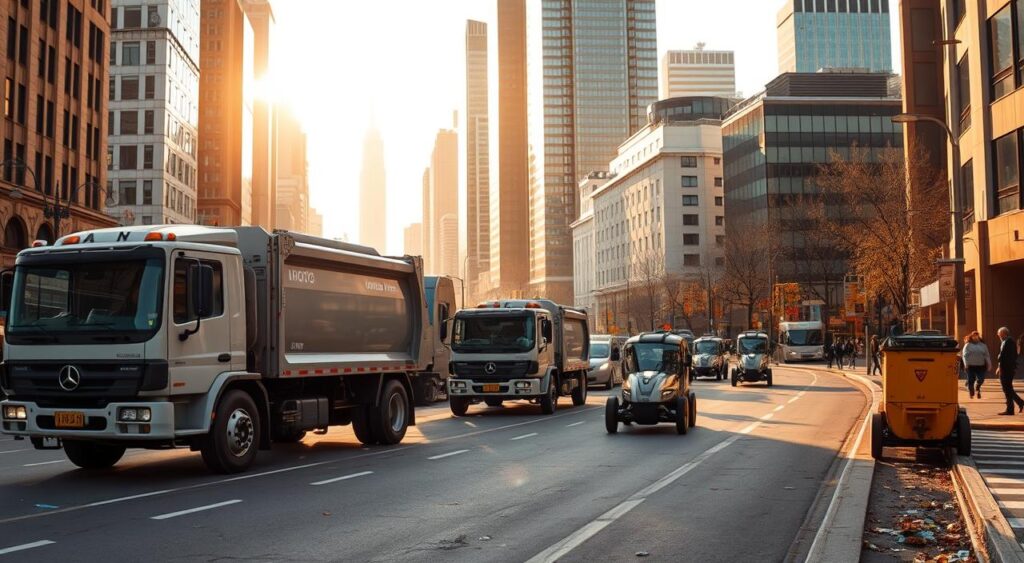In the UK, rubbish removal is changing fast. Cities like London and Bristol are using AI to manage waste better. Now, companies use robots to sort recyclables and self-driving trucks to collect bins.
This makes streets cleaner and helps use resources better for everyone.

Old ways of collecting waste are struggling with more people and green goals. AI helps by looking at data from smart bins to plan better. Robots in recycling centres sort materials quicker, making plastics and metals cleaner.
This change is not just about being more efficient. It’s about making waste management in the UK more green.
Key Takeaways
- AI optimises rubbish removal routes, cutting fuel use by up to 30% in trials.
- Robotics in waste management facilities reduce human error during sorting tasks.
- Smart sensors in bins alert teams when full, preventing overflow in public spaces.
- Leading firms like Binn Group and Cleanaway UK already deploy AI in their operations.
- Public-private partnerships are driving adoption of these technologies nationwide.
Introduction to AI in Waste Management
Artificial intelligence (AI) and robotics are changing how the UK deals with waste removal. These technologies use data and automation to make things better. Let’s look at how they work and why they’re important.
What is AI and Robotics in Waste Management?
AI systems look at data to predict waste levels or find contamination. Robotics do tasks like sorting materials or driving vehicles. For example, UK firms like Veolia use AI sensors in bins to tell teams when they’re full. Recycling plants use robotic arms powered by AI to sort items faster than humans.
The Importance of Technology in Rubbish Removal
- Landfill space is limited—AI helps reduce reliance on landfills by optimising recycling.
- The UK’s recycling targets require advanced sorting, which AI achieves more accurately than manual methods.
- Labour shortages in waste management are eased by automation, keeping services running smoothly.
These innovations aren’t just technical fixes. They solve real problems affecting communities every day. From cleaner streets to meeting environmental goals, technology makes waste disposal smarter and greener.
Current Trends in Rubbish Removal
Smart technology is changing how UK cities manage waste. Innovations like sensor-equipped bins and automated systems are tackling challenges such as traffic congestion and inefficient routes. Let’s explore how these tools are shaping modern garbage collection practices.
The Shift Towards Smart Waste Management
Smart bins now monitor fill levels in real time, sending data to optimise collection schedules. This reduces unnecessary trips and cuts fuel use. Key features include:
- Sensors alert teams when bins are full
- Route-planning software reduces travel time
- Public apps show bin locations and capacity
Increasing Use of Robotics in Collection
Robotics streamlines garbage collection in tight urban spaces. Below compares how Edinburgh and Manchester are leading this change:
| City | Technology | Benefits | Challenges |
| Edinburgh | Sensor-linked bins | 30% fewer collection runs | Initial installation costs |
| Manchester | Automated lifting arms | Cuts worker injury risks by 40% | Training for drivers |
These updates help cities like Edinburgh and Manchester handle narrow streets and high waste volumes efficiently.
Benefits of AI in Rubbish Removal
AI is changing trash removal in the UK for the better. It makes collections faster and recycling smarter. These changes are making a big difference across the country.
Efficiency and Speed
AI helps plan the best routes for waste collection. For example, Manchester’s waste fleet is now 22% faster. This is thanks to AI routing software.
Trucks only visit bins when they’re full. This saves fuel and cuts down on emissions.
- London boroughs report 15% faster collections with AI
- Cambridge reduced idling time by 30% through predictive maintenance
Cost Reduction for Waste Management Companies
Companies like Veolia and Grundon Waste Management are saving money with AI. They use it to cut fuel costs by 18% by planning better routes.
AI also helps prevent expensive repairs. This can save up to £45,000 a year for each fleet.
Enhanced Sorting Capabilities
AI makes sorting waste much better. Now, 95% of recyclables are recovered, up from 70% before.
Here are some recovery rates from UK facilities:
| Facility | Pre-AI Recovery Rate | Post-AI Recovery Rate |
| Birmingham Recycling Centre | 68% | 92% |
| Glasgow Materials Recovery | 72% | 94% |
| Southampton EcoPlant | 75% | 96% |
This improvement cuts contamination rates by 40%. It makes recycled materials better and increases revenue for recyclers.
How AI Improves Recycling Processes
AI is changing recycling services in the UK. It automates sorting and detects contamination. This makes recycling more efficient and effective.
Places like Birmingham and Leeds are using AI to solve long-standing problems. This ensures more materials are reused sustainably.
AI-driven recycling services contamination reduction.

Intelligent Sorting Systems
Modern sorting systems use cameras and machine learning. They can identify materials quickly. For example:
- Optical scanners differentiate plastics, metals, and glass in real time
- Robotic arms equipped with AI algorithms place items into correct streams
- Systems in Birmingham’s recycling hubs now achieve 98% accuracy rates
Contamination Reduction Solutions
AI cameras scan waste streams to find non-recyclable items. Leeds’ facilities use these systems to:
- Identify contaminants before they enter processing lines
- Reduce rejected batches by 40% since 2022
- Alert workers to manually remove problematic materials
Plant-Level Innovations
Places like Manchester’s WasteTech Hub use AI to:
- Monitor material flows in real time
- Adjust sorting parameters automatically
- Optimise storage space using predictive analytics
These upgrades help meet UK recycling targets while lowering costs. Residents can trust their waste is being processed more effectively than ever before.
The Role of Data Analytics
Data analytics is changing how the UK handles waste disposal and resource planning. It tracks waste volumes, collection routes, and disposal outcomes. This helps councils like Bristol City Council and Manchester City Council find trends in waste streams.
Understanding Waste Generation Patterns
Smart bins with sensors gather data on waste buildup. They help identify hotspots, like more food waste in cities or construction debris in development zones. This information helps teams avoid overfilling sites and reduce unnecessary collections.
Predictive Analysis for Resource Management
Seasonal trends help make better decisions. For example:
- Summer leads to more garden waste, so extra green bin collections are needed.
- Christmas increases packaging waste, leading councils to adjust schedules using data analytics.
This insight helps managers plan staff and vehicle use better. It cuts costs and emissions. London’s Citymapper app even shares updates, making collections more efficient.
Autonomous Vehicles in Rubbish Removal
Autonomous vehicles are changing how debris removal works in UK towns. Cities like Cambridge and Milton Keynes are testing self-driving trucks. These trucks collect waste without human drivers, using sensors and AI to navigate.

Overview of Self-Driving Waste Collection Trucks
Trials show these trucks can handle tight spaces, like narrow roads and busy city centres. Companies like Veolia and Grundon Waste Management are working with tech firms. The trucks use cameras and GPS to map routes, adjusting as they go.
Safety Innovations and Technology
Key safety features include:
- LiDAR sensors detecting obstacles up to 200 metres away
- Emergency stops activated by pedestrian movements
- Real-time alerts if a truck drifts from its lane
These features focus on protecting cyclists, pedestrians, and property. While fully autonomous fleets are years away, steps like driver-assisted systems are already reducing accidents. As technology improves, these vehicles will make UK streets cleaner and safer.
Challenges Faced by AI in Waste Management
AI-driven systems in junk removal services offer promise but face challenges. UK local councils struggle to balance innovation with existing systems and community needs.
Integration with Existing Systems
Many UK waste management firms find it hard to merge AI tech with older systems. London’s 2022 trial with automated sorting was delayed due to outdated facilities. Retrofitting costs often exceed budgets, with some companies facing 40% higher expenses than planned.
Public Acceptance and Trust
Residents in Manchester were concerned about privacy after smart bins with facial recognition were installed in 2023. Questions about data security and job losses during pilot programs in Birmingham sparked debates. But councils using open forums and demo days, like Surrey’s “Tech Talks” initiative, have seen 20% higher approval rates. Being open about how AI improves services, not replaces human workers, helps build trust.
Case Studies: Successful Implementations
Let’s look at real-world success stories from UK companies leading in AI-driven waste management. These examples show how adopting new tech improves junk hauling and recycling efforts.
Biffa, a major UK waste firm, uses AI to optimise collection routes. Their system reduced fuel use by 20% and cut costs by 30%. Veolia implemented smart bins in Manchester, boosting recycling rates by 45% by identifying contamination in real time. First Mile’s AI sorting robots process 98% of materials correctly, cutting manual labour time by half.
| Company | Technology Used | Key Result |
| Biffa | Route-optimisation AI | 20% less fuel, 30% cost reduction |
| Veolia | Smart bin sensors | 45% rise in recycling rates |
| First Mile | Robotics + AI sorting | 98% accuracy in material separation |
Lessons Learned from Early Adopters
- Collaborate with tech partners for tailored solutions
- Train staff on new systems to maintain efficiency
- Communicate benefits clearly to residents to boost participation
These success stories show that AI and robotics are more than just tech. They lead to smarter junk hauling, better community engagement, and clear results. Whether it’s cutting costs or improving recycling, these examples offer strategies for others to follow.
Future of Rubbish Removal with AI
The next decade will bring exciting changes in AI and robotics for debris removal. New future technology could change waste management, tackling urban space limits and environmental goals. Let’s look at what’s coming for UK communities.
Trends to Watch in the Coming Years
- Drone surveillance: Drones will watch landfill sites and streets to spot problems quickly.
- Material scanning: AI systems will spot recyclables with 99% accuracy, reducing landfill use.
- Automated facilities: Sorting hubs may work 24/7 with no human help by 2030.
Potential Developments in Robotics
| Robot Type | Current Use | Future Potential |
| Walking robots | Testing in mountainous regions | Deployed in historic areas to avoid damaging cobblestone streets |
| Home sorters | Pilot projects in 10 UK cities | Household units that sort recyclables before collection |
| Autonomous trucks | Early trials in London | City-wide networks by 2035, cutting fuel use by 40% |
These changes aim to help the UK meet its net-zero goals and adapt to post-Brexit sustainability laws. Soon, robots might handle tricky collections near heritage sites or apps guide residents to optimise bin days. While full implementation takes time, early adopters like Thames Water and Veolia are already testing prototypes in Manchester and Bristol.
Legislation and Policy Impacting AI Waste Management
The UK’s waste management legislation is crucial in shaping AI’s role in recycling and disposal. New policies ensure innovations like robotic sorters and autonomous trucks meet safety, data privacy, and environmental goals. Let’s explore how these rules balance progress with responsibility.

Regulatory Framework for AI in Recycling
Key waste management legislation includes strict data protection laws for AI systems handling citizen data. Autonomous vehicles must meet EU-derived safety standards, even post-Brexit. The Environment Act 2021 also mandates performance targets for reducing landfill use, pushing firms to adopt smarter recycling tech. These rules ensure AI solutions are both effective and trustworthy.
Support for Sustainable Innovations
- Sustainability initiatives like the UK’s Industrial Strategy Challenge Fund provide grants for AI-driven waste projects.
- Local councils offer tax breaks to companies testing AI in recycling facilities.
- Post-Brexit environmental laws now prioritise circular economy goals, speeding up approvals for tech that cuts carbon footprints.
These policies turn challenges into opportunities, helping UK communities benefit from cleaner, tech-powered systems while safeguarding public interests.
Consumer Awareness and Responsibility
While AI transforms waste systems, individual actions remain vital. Recycling education and public engagement ensure these technologies work at full potential. In the UK, cities like Bristol and Leeds show how communities and tech can thrive together.
Public Participation Fuels Efficiency
People in areas with smart bins or apps like MyWaste notice big changes. Apps let users check when bins will be emptied and report problems. This boosts public engagement. Here are ways to help:
- Sorting waste right to help recycling machines
- Using tools to track and improve habits
- Participating in local recycling events or online challenges
Learning for a Greener Future
Recycling education in schools and community centres teaches the right way to dispose of waste. Leeds’ EcoSmart app, for example, uses games to encourage correct sorting. Here are two UK success stories:
| City | Initiative | Outcome |
| Bristol | AI-guided recycling stations | 30% contamination reduction |
| Leeds | EcoSmart app challenges | 45% participation rate increase |
Every small action counts. By learning and getting involved, we help AI systems work better. Together, technology and people can make cities cleaner and smarter.
Conclusion: The Impact of AI on Future Practices
AI and robotics are changing UK waste management for the better. Smart waste solutions are already cutting costs, increasing recycling, and reducing environmental harm. As this tech improves, it will change how we handle waste and meet national sustainability goals.
Summarising Key Takeaways
AI-driven innovations like autonomous trucks and smart sorting systems are making waste management more efficient. These tools help spot waste patterns, plan better routes, and cut down on contamination. But, there are challenges like making sure systems work together and gaining public trust. Early adopters in the UK show that these technologies can make a real difference with the right communication and community support.
The Vision for a Cleaner, Smarter Future
The UK’s future in waste management depends on growing these technologies wisely. By 2030, cities might have bins with sensors, driverless lorries, and data networks guiding waste decisions. It’s important to make sure these advances are fair and accessible for everyone. Balancing innovation with fairness will help create a future where smart waste solutions protect our environment and improve our lives. With more investment and teamwork, the UK can turn waste into a valuable resource.





